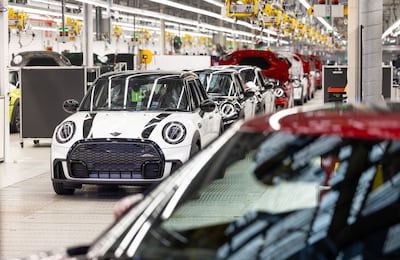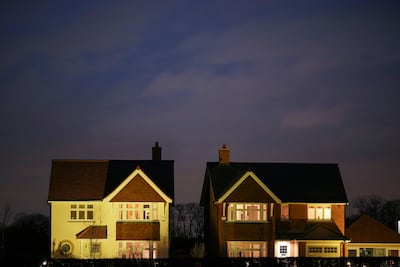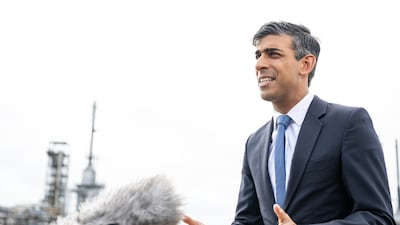Rishi Sunak set a bonfire under the "auto-pilot" targets for the UK's net-zero policies on Wednesday as he vowed to meet carbon targets while pushing back deadlines for drivers, householders and consumers to make carbon neutral choices.
An announcement at Downing St launched the prime minister into a political gamble involving high stakes measures for the economy and climate to underpin a new change agenda for the UK.
Downing Street framed the change of tack as a way to ease the burden of net zero even as experts said the costs could end up higher if Britain drives away investment in clean technology. The slogan at Mr Sunak's press conference in Downing St was “long-term decisions for a brighter future”.
Observing he had spent his first year as prime minister bringing back stability he told the public how he was going to change the nation, adding "we make too little", "we spend too much" and that "our destiny can be our own choosing". “We have stumbled into a consensus about the future of our country that no one seems to be happy with," he said. "We risk losing the consent of the British people.”
Promising that the consumer could make the choice on buying electric vehicles, he said he would extend time for purchases of petrol cars and vans by five years, to 2035.
He said his government would push back a ban on buying new boilers, saying the law was imposing the upgrade even if homes were unsuitable for heat pumps, to 2035. Grants for installing heat pumps were raised by 50 per cent to £7,500.
Home owners planning to insulate their homes would be eligible for subsidies but the government would not force households to install expensive insulation to meet the UK's net zero needs. He also hit out at proposals for taxes on eating meat or flying, as well as “a government diktat to sort your rubbish into seven different bins”.
MPs, environmentalists and business leaders raised the alarm ahead of the climbdown, which had been leaked the previous night. Former prime minister Boris Johnson said Britain "cannot afford to falter now".
Ford, the car manufacturer, issued a statement saying it expected “ambition, commitment and consistency” from the UK and that an about-turn would “undermine all three”.
Energy company E.On called the U-turn on heating a "mis-step on many levels" that could "condemn people to many years of living in cold and draughty homes". Heat pump manufacturers have been touting their technology as an alternative to gas boilers that were meant to be phased out from 2035.

“Good, stable policy brings in investment and it brings down costs,” Louise Marix Evans, a sustainability consultant and former adviser to the UK’s Climate Change Committee, told The National.
“We need to know our government’s enabling economic growth and good investment rather than repelling it to other places. There is money out there for the green transition and so we’re just going to ping it over to Europe or America or China.
“It’s just such good business sense. I don’t see why they would let us down, not to mention the fact that I’m sitting here with flood alerts and we’ve had a heatwave this summer.”
Rebecca Newsom, Greenpeace UK's head of politics, said the climbdown would "only hasten our waning influence on the world stage" after Britain sat out a UN summit on climate ambition in New York.
"The grim reality is that Britain is no longer seen as a serious player in the global race for green growth," she said.
Political opening
Mr Sunak has already positioned himself as a friend of the motorist and announced plans to “max out” the UK’s North Sea oil and gas reserves. He is expected to make a speech this week setting out his new approach to net zero. He also observes that the UK has overdelivered on its carbon budget adding he was confident that it would continue to do so while easing the burdens on ordinary people.
There is some support for a backtrack on the Tory right. Mr Sunak’s predecessor Liz Truss resurfaced to call for a delay to green policies a day before the plans leaked to do just that. Former Brexit negotiator David Frost told ministers to “back off unrealistic net zero targets”.
It is not that simple for Mr Sunak, though, as plenty of other Conservatives would be infuriated by a retreat from net zero. Former minister and Cop26 president Alok Sharma said scrapping green policies “will not help economically or electorally”.
Simon Clarke, a former chief secretary to the Treasury, said his “Red Wall” constituents in north-east England – the prized swing voters who decided the last election – “overwhelmingly support” the drive to net zero.
“Businesses rely on certainty to make major investments … it is unclear how they are to plan at all if we respond to one by-election in west London by tearing up key planks of government policy.”
Economic fears
Mr Sunak says the overarching 2050 net-zero goal is staying in place but will be pursued in a “more pragmatic way”. Home Secretary Suella Braverman said ministers could not “save the planet by bankrupting Britain”.
But the government was warned that if Britain wants to hit net zero in 2050 while going slower on cars and heating, it will have to go faster elsewhere – even as the leak suggests Mr Sunak will rule out promoting lifestyle changes.

“A delay to the phase-out of petrol cars and boilers would very likely break our carbon targets, breaking our climate change commitments,” said Peter Chalkley, the director of the Energy and Climate Intelligence Unit.
“If he doesn't have a plan for how to cut those emissions now, how can he jettison these policies? What is his plan B?”.
In addition, Ms Marix Evans said that going slower on cars and heating could have knock-on effects on investment in renewables and clean technology.
“If you’re investing over the long term in the electricity grid, you’re making a load of assumptions about what that grid needs to do,” she said. “All of the wind will go out of those sails and people will take that innovation somewhere else," she said.


